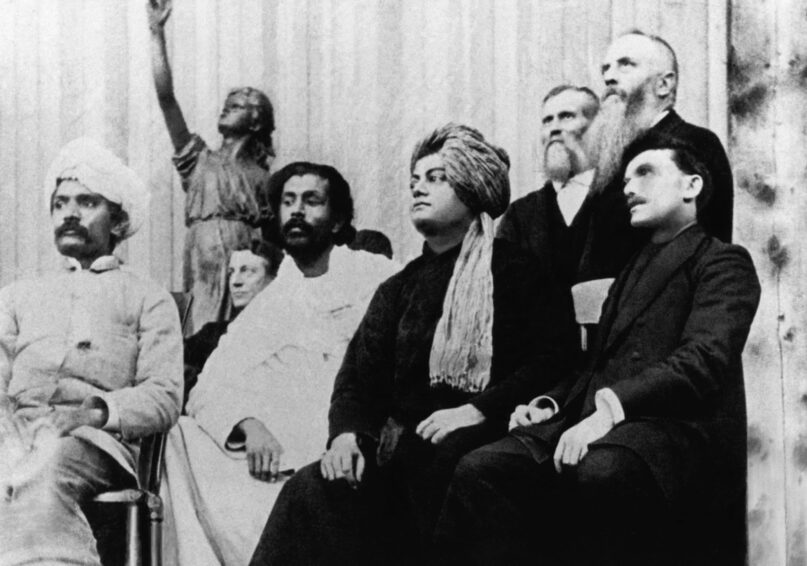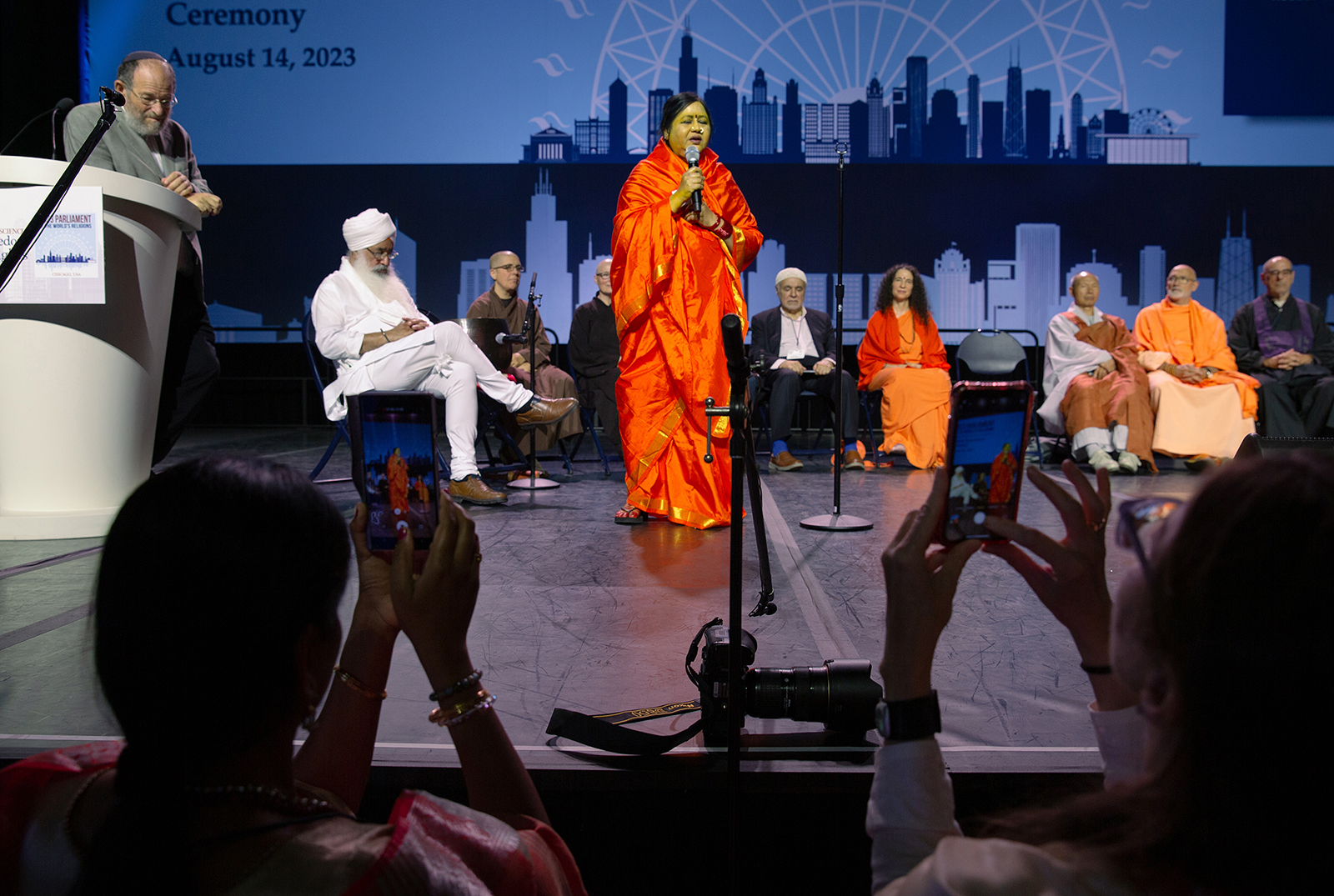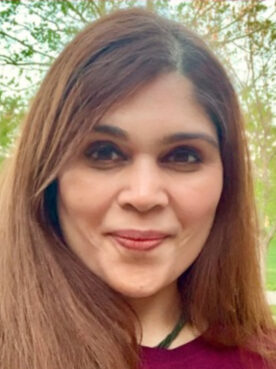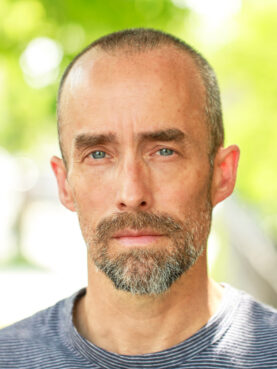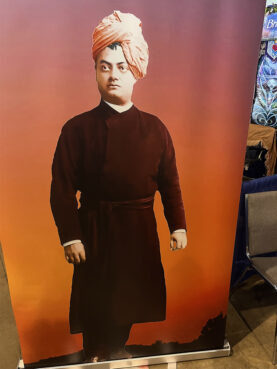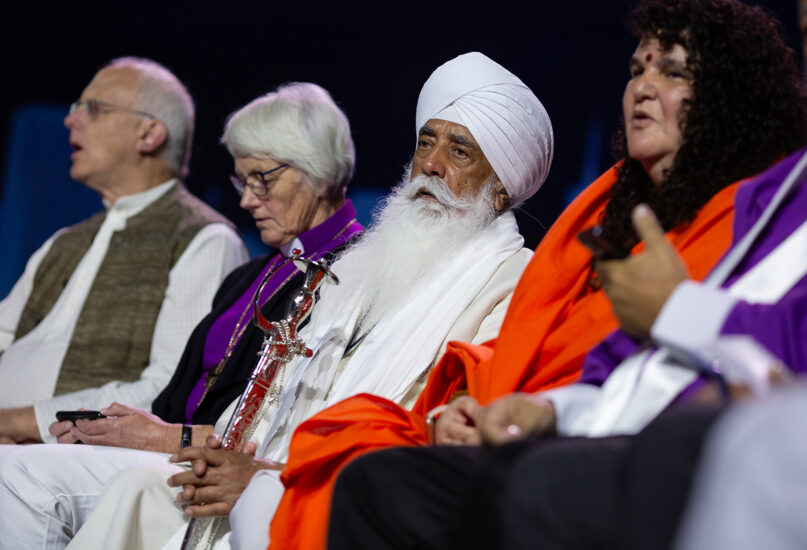India’s Hindu nationalism is exporting its Islamophobia
Hindutva is linking with other modern fascist movements across the globe.

(RNS) — For years, one of the biggest threats to Muslims in the world has been the reinvention and rise of Hindu nationalism in India. This is in part because of the sheer number of Muslims in the country: Indian Muslims represent 10% of all Muslims worldwide. Now the movement known as Hindutva (“Hindu-ness”) is not only threatening Indian Muslims or India’s proud democratic tradition, it is spreading its radical nationalism around the globe.
The man behind India’s modern revival of Hindutva is Prime Minister Narendra Modi, whose career began in the ultraconservative Hindu organization Rashtriya Swayamsevak Sangh. In the early 2000s, when Modi was chief minister of the western Indian state of Gujarat, a series of anti-Muslim riots there led to nearly 2,000 deaths by some estimates. Modi, who implicitly condoned the violence by doing little to stop it, became known as the Butcher of Gujarat. In 2005, Modi was denied entry to the United States under the International Religious Freedom Act.
But after Modi became prime minister in 2014, President Barack Obama welcomed him over fierce objections and protests from Indian Americans and human rights advocates. Presidents Donald Trump and Joe Biden have continued to normalize Modi’s facism, not only allowing him to visit but, in the case of Trump, appearing with him at a Texas rally celebrating his leadership.
In India, Hindutva has most egregiously impacted Muslims in Gujarat and Uttar Pradesh, but Hindutva has begun to come west. Last month in Leicester, England, young Hindu men marched through the streets chanting “Jai Sri Ram” — “Glory to Lord Ram,” a Hindu nationalist war cry — and attacking Muslims. Attacks at local houses of worship ensued, and nearly 50 people have been arrested.
RELATED: Recent incidents from New York to California buttress concerns about Hinduphobia
Pratap Bhanu Mehta, a public intellectual in India, wrote that the tensions in Leicester followed a familiar ethno-nationalist playbook for stoking violence: “the use of rumors, groups from outside the local community, and marches to create polarization in otherwise peaceful communities.”
Majid Freeman, a Muslim activist, told The New York Times’ Megan Specia that the Hindu nationalist aggression in Leicester had drained public trust in the historically diverse community, where Muslims and Hindus together make up about a quarter of the population. “We just want the city to go back to how it was,” said Freeman. “Now everyone is looking over their shoulders.”
Across the Atlantic, at an India Independence Day parade in Edison, New Jersey, the festivities included a bulldozer draped with a picture of Modi, whose political party, BJP, is associated with Hindutva causes. Bulldozers have become a symbol of Islamophobia in India, where they have been used to demolish homes belonging to Muslims on the mere suspicion of participating in protests or riots. A few months ago, I spoke with Afreen Fatima, an Indian Muslim activist whose home was bulldozed and her father imprisoned.
Pranay Somayajula, outreach coordinator for Hindus for Human Rights, has emphasized the need for urgent action to counter the spread of Hindutva. “The diaspora, and in particular Hindu Americans, urgently need to speak out against the infiltration of Hindutva hatred into our communities,” Somayajula said.
Modi’s Hindutva is part of a wider rise in fascist movements across the globe. Masked as ultraconservative nationalism, modern fascism has developed as a racist and anti-immigration identity, rooted in ignorance and moral decay. In many places, it includes a virulent Islamophobia. India’s ethno-nationalism has created bonds with other states, such as Israel.
RELATED: Dispute over mosque becomes religious flashpoint in India
Indeed, in 2019, Sandeep Chakravorty, India’s consul general to New York City, told Kashmiri Hindus and Indian nationals that India will foster Kashmir’s depleted Hindu population by building settlements modeled after Israel’s implanting of Jewish residents in Palestinian communities.
To those paying attention, Hindutva is a growing international crisis. The threat of genocide is an abomination emanating from the world’s largest democracy, and it’s already spilling over into our politics and streets at home.
Hindu advocates sue California, arguing bans on caste discrimination misrepresent beliefs
At the crux of the HAF lawsuit is the question of whether caste is inherently tied to Hindu dharma.
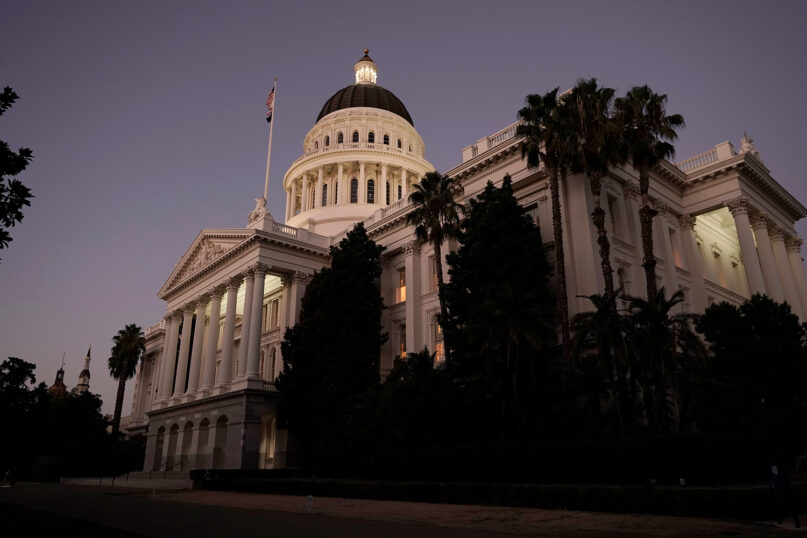
(RNS) — The Hindu American Foundation has filed a complaint against the state of California, objecting to a recent caste discrimination lawsuit that the group said “violates the constitutional rights of Hindu Americans.”
“By falsely claiming that Hindu Americans inherently hold discriminatory beliefs in a caste system, and these beliefs and practices are ‘inherent’ to the Hindu religion,” said Suhag Shukla, attorney and executive director of the Hindu American Foundation, in the complaint filed Thursday (Sept. 22), “the State is treating Hindus in a manner that is different from the way it treats every other religious group.”
In a landmark suit originally filed in 2020, an anonymous Cisco employee in California claimed his Hindu supervisors cut him out of meetings and failed to promote him because he is a Dalit, a member of a lowest stratum of South Asia’s social and religious caste hierarchy. He further claimed that Cisco officials retaliated against him after he brought the discrimination to their attention.
Cisco maintained that there was “no evidence” that he suffered either discrimination or retaliation specifically through the “Indian caste system.”’
RELATED: How California State University is unjustly targeting South Asians
The Hindu American Foundation has long said that ending caste discrimination is a “worthy goal” that directly furthers Hinduism’s belief in the equal and divine essence of all people. The foundation also says that caste is not a core tenet of the Hindu religion and should not be assumed as such by the California Department of Civil Rights.
A spokesperson for the Department of Civil Rights said it would respond to HAF’s complaint in court.
The Cisco lawsuit comes as some Hindus have pushed for various American institutions, from corporations to universities, to officially recognize caste discrimination. In a 2018 report cited in the original lawsuit, the Dalit civil rights group Equality Labs found that 67% of Dalits surveyed felt unfairly treated at their U.S. workplaces.
In 2016, the same group found a third of Hindu students in the U.S. reported experiencing caste discrimination. Dalits have cited instances of employment discrimination at several companies, including Alphabet, the company that owns Google, and Microsoft.
RELATED: Why Cal State’s new caste discrimination policy is a critical step
The International Commission for Dalit Rights, a 2-decade-old organization based in Virginia, has repeatedly but unsuccessfully pressed the U.S. Equal Employment Opportunity Commission to recognize casteism against historically oppressed groups as “an urgent contemporary U.S. civil rights and social justice issue.”
In 2020, following the lead of Brandeis University and Colby College, the California State University system passed a resolution to add caste as a category of discrimination, making it easier for students and faculty to report anti-Dalit bias. In response, HAF led a petition against the move and it was signed by more than 80 faculty of Indian origin.
HAF insisted then that treating caste as a specific class of discrimination is a “misguided overreach.” They argued that it is unconstitutional to identify a form of prejudice held only by people of one faith or national background as “so entirely different and abhorrent that it renders this group a suspect class meriting special monitoring and policing.”
Sunil Kumar, a professor of engineering at San Diego State University, wrote at the time, “Rather than redressing discrimination, it will actually cause discrimination by unconstitutionally singling out and targeting Hindu faculty of Indian and South Asian descent as members of a suspect class because of deeply entrenched, false stereotypes about Indians, Hindus, and caste.”
At the crux of the HAF lawsuit is the question of whether caste is inherently tied to Hindu dharma, a widely misunderstood issue that stems across time and institution. Some argue that caste was imposed on Indian and other historically Hindu people by colonial administrators during British rule of South Asia and that it no longer plays a part in everyday life. Other Hindus call this view disingenuous, saying caste has its origins in Hindu scripture, which is still used to legitimize it. They also point out that caste is found among Hindus outside South Asia.
RELATED: How American couples’ ‘inter-Hindu’ marriages are changing the faith
“As Hindus, we work to uplift a vision of Hindu identity that acknowledges this history, but also rejects caste as a betrayal of our traditions’ highest teachings of human dignity and equality,” said Ria Chakrabarty, policy director for the advocacy group Hindus for Human Rights.
Chakrabarty said Hindus need to acknowledge the caste system as it operates today, rather than argue over its origins, before they can help solve the discrimination many say they’ve encountered.
“In the meantime, we will stand shoulder to shoulder with our Dalit American siblings in their fight against discrimination and ensure that caste is a protected category for civil rights,” said Chakrabarty.
Gen Z Hindu Americans reckon with faith and politics
For Hindu American students looking to practice their faith absolved of politics, there is a distinct lack of places to turn.
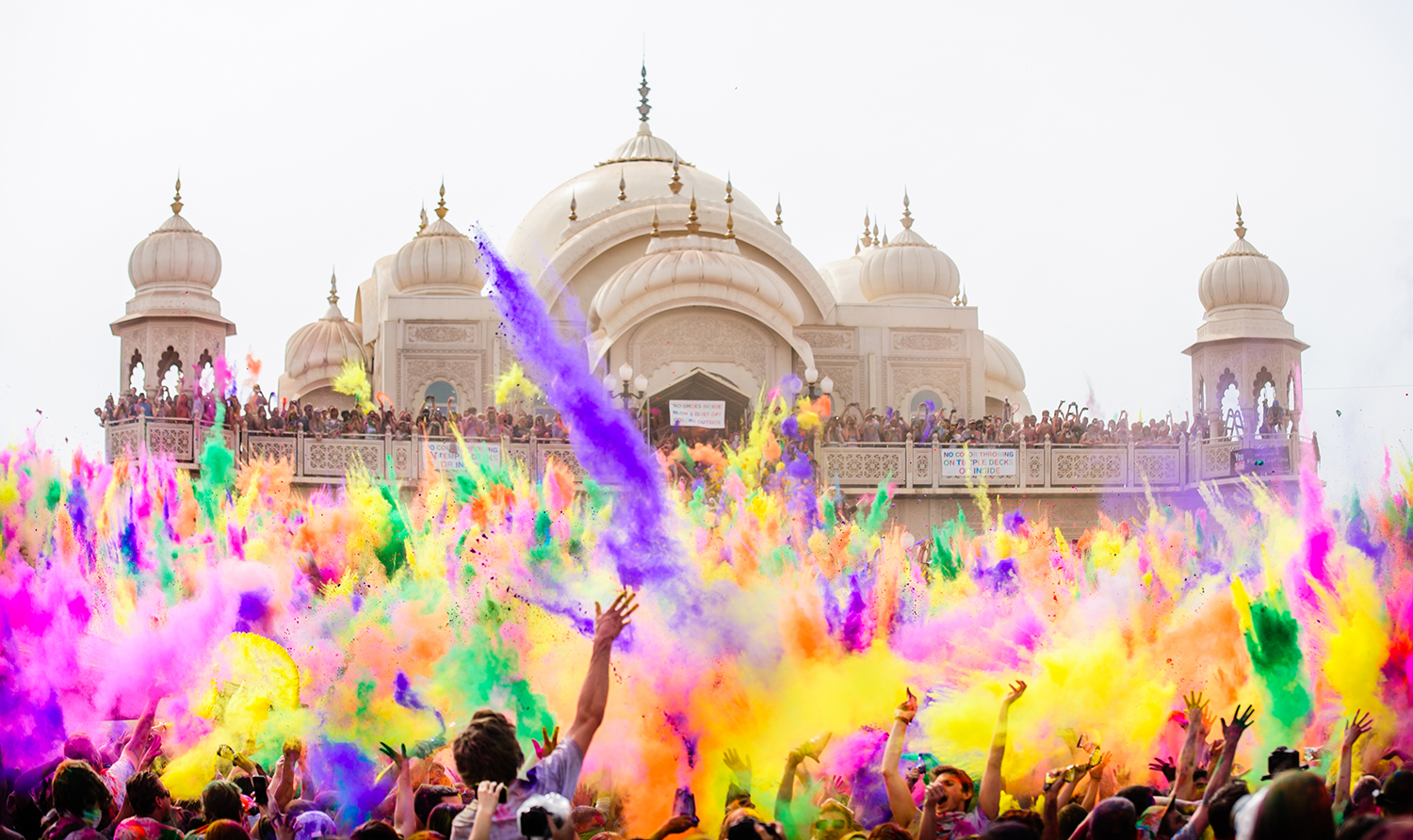
The Hindu tradition of Holi is one of the Hindu festivals adopted by many Americans. The recognizable throwing of color is now found in events and festivals across the U.S. Courtesy photo
(RNS) — Three years ago, Abby Govindan, a Twitter personality and stand-up comic, was invited to perform at “Howdy Modi,” a rally featuring Indian Prime Minister Narendra Modi and then-President Donald Trump, held in her home city, Houston.
After much deliberation, Govindan turned the appearance down. While it was a chance to perform at NRG Stadium in front of 50,000 fellow Indian Americans, Govindan didn’t want to show tacit support for the Indian politician whose name has become synonymous with Hindu nationalism.
“I love India. I am so proud to be Indian, but I am not proud of Modi,” said Govindan. “It would make my parents proud, but at the end of the day, my morals are all I have.”
For Hindus of Generation Z, the age cohort that is now in college or just graduated, fashioning an Indian and a Hindu identity apart from India’s contentious political climate is increasingly difficult. Since Modi was elected prime minister in 2014 as leader of the Hindu nationalist BJP, he has been criticized as a threat to India’s long-standing secular democracy, and the partisan rancor has begun to divide the Indian diaspora in the U.S.
For American students looking for a Hinduism absolved of politics, there is a distinct lack of places to turn.
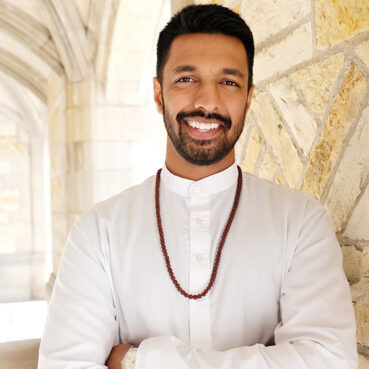
Amar Shah. Photo courtesy of Northwestern University
“Right now, there is the appearance that Hinduism is inextricably tied to international Indian politics,” said Amar Shah, the first Hindu chaplain at Northwestern University. “Students are having to navigate some of those oversimplifications that may be from their peers, from their own parents and from other students from other faith groups.”
Hindu students arriving on large campuses will find a wide variety of groups offering community, a social circle and a shelter against ignorance about their faith and culture. But much of the time, these groups are either tied to Hindutva politics or are actively opposed.
The Hindu Students Council, the oldest and largest pan-Hindu student organization, with over 60 chapters in high schools and colleges, is a project of the Vishva Hindu Parishad (World Hindu Council), itself historically linked to the BJP and its older, umbrella nationalist organization called the RSS.
The Hindu Students Council offers what it calls authentic Hindu practices and traditions and attempts to create a safe space for Hindu students who, it says, are fearful of getting ridiculed for their practices by non-Hindu classmates.
“Usually with other religious groups, from a young age they have this sense of community, a set of friends and a set of events every year to celebrate their religious festivals,” said Vishnupriya Parasaram, vice president of education and advocacy at Hindu Students Council, who only discovered the council after graduating from the University of Oklahoma. “Having that would’ve been helpful to feel secure in my Hindu identity.”
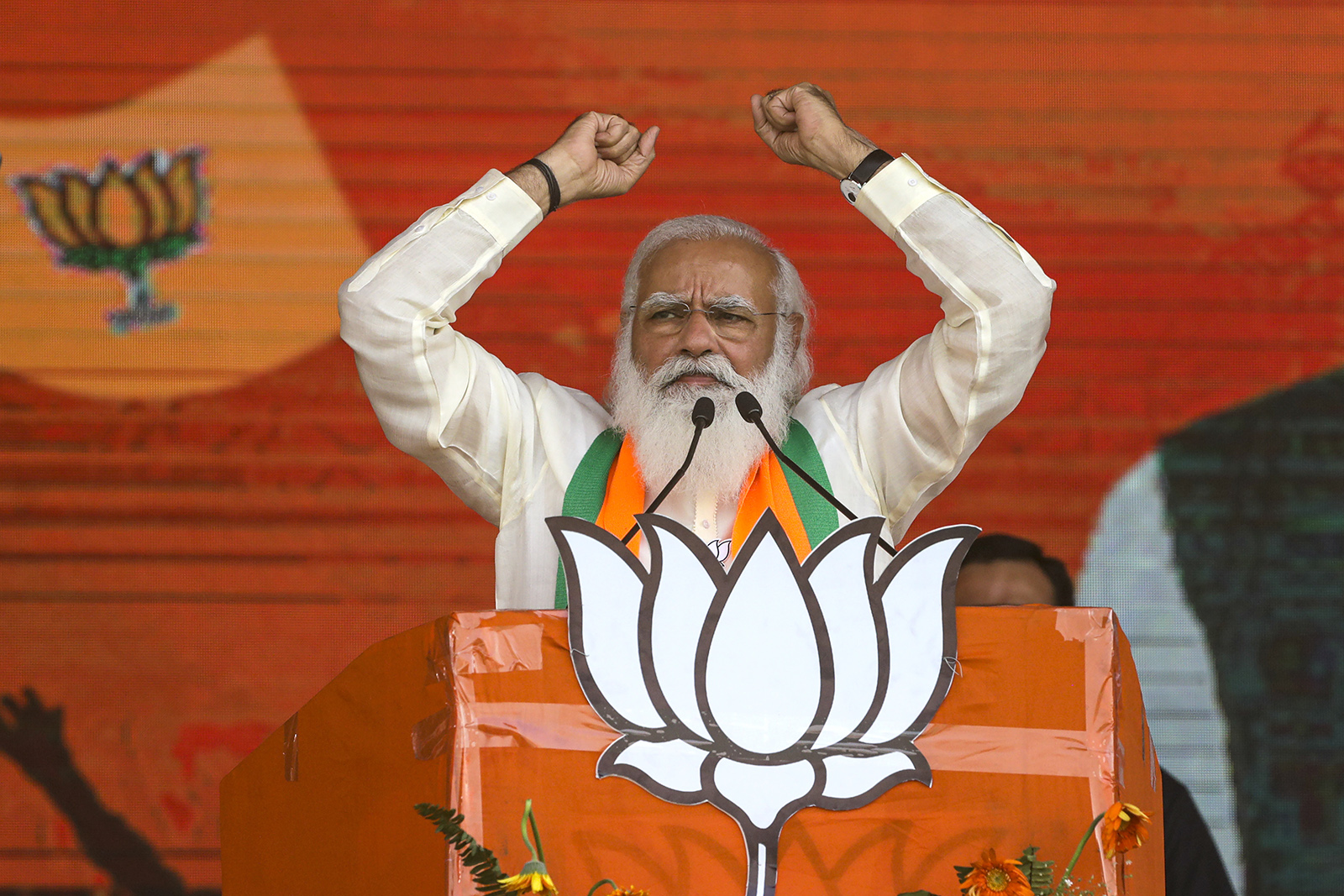
In this March 7, 2021, file photo, Indian Prime Minister Narendra Modi addresses a public rally ahead of West Bengal state elections in Kolkata, India. (AP Photo/Bikas Das, File)
The HSC’s alignment with BJP has caused trouble from its start. Three years after its founding, Columbia University’s Hindu Students Association separated from the council, citing its ties to right-wing Indian groups. The Columbia students punctuated the break by walking out of a speech by a Vishva Hindu Parishad representative who spoke in support of the demolition of the Babri Masjid, a mosque situated on the Hindu holy site of Ayodhya that was pulled down in 1992 by a mob. The council claims it has been the target of hostility ever since.
Parasaram objects that critics don’t distinguish between Modi’s politics and that of the Hindu diaspora. “Why is my Hindu identity being conflated with being Indian? To corner us and always tie us in with a political belief is just not doing justice to our story,” she said, pointing out that politics don’t define Hinduism, which exists in many places outside India.
But Hindu youth say the political climate in India is an unavoidable conversation.
“If you’re a Hindu student arriving on campus and you want to find a Hindu community, oftentimes the only Hindu association is the HSC,” said Pranay Somayajula, the 21-year-old organizer for Hindus for Human Rights, a liberal advocacy group. “It creates this nefarious pipeline that funnels otherwise progressive, left-leaning young Hindu Americans into this Hindutva ideology.”
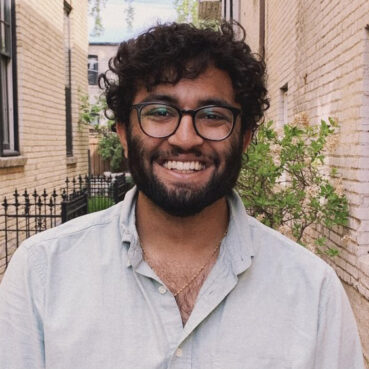
Pranay Somayajula. Photo courtesy of HHR
Somayajula said studying human rights and international justice at George Washington University has deepened his Hindu faith. While on campus he joined Students Against Hindutva Ideology, an organization that began the #HoliAgainstHindutva initiative in 2020. Through the group, he met Sunita Viswanath, co-founder of the social justice organizations Sadhana and Hindus for Human Rights, both of which have been vocally against the Indian government’s treatment of minority religious groups.
“Especially for those of us who are Hindu, I really want to see my peers step up and say this should not be happening in the name of my faith,” said Somayajula. “That’s not what the Hinduism I was brought up with is all about.”
Shoumik Dabir, a 23-year-old who attended the University of Texas, spent part of his sophomore year interning with the Hindu American Foundation, which, while maintaining a politically centrist stance, staunchly defends the faith against discrimination. Dabir also spent a summer as a community organizer for HSS, a service organization that is an international arm of the right-wing RSS.
But Dabir said that Hindu nationalism is not directly analogous to the Christian nationalism that has polarized American politics and figured in the Jan. 6 Capitol attacks. “Diaspora folks tend to look at Indian politics with the same framework and lens as they understand American politics,” said Dabir, saying many Gen Z American Hindus don’t look past what they read in The New York Times.
RELATED: Hindu American Foundation files defamation suit against Hindu rights nonprofit

Abby Govindan. Photo via Instagram/@abbygovindan
Govindan, whose parents supported the BJP until she changed their minds about Modi’s intentions, agrees that many Hindu Americans she interacts with are not thinking critically about politics in India, and go along with their parents’ views.
She added that reckoning with faith and identity is a common struggle for many children of immigrants of all heritages.
Indeed, polarization over Hindutva won’t end with the current generation’s graduation from college; if anything, many campus groups, on the right and the left, are simply battling for young minds in the name of their parent organizations.
Viswanath said the political and spiritual awakenings had by Generation Z will dictate the future. ”I have three kids,” she said. “I have to believe there is good in human beings, and that some of us will find some way of contributing to peace and love and good.”
But Shah, the Hindu chaplain at Northwestern, said the lack of institutional support to help Hindu students find balance is a problem. (He is Northwestern’s first Hindu chaplain, and he has few counterparts elsewhere in American academia.) He tries to act as a mediator and a unifying force, bringing together those who differ in message and goal.
“On both sides, we really need to sit down and have discourse with like-minded, good people who are trying to also serve the purpose of learning, rather than to take down or take a stance for political gain.”
